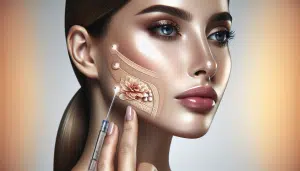Secrets You Might Not Know About Retinol Skincare
Charlotte Stone October 20, 2025
Explore the hidden world of retinol skincare routines, benefits, and common myths. Discover how this popular beauty ingredient changes skin texture, supports healthy aging, and why it fascinates skincare enthusiasts everywhere.
Understanding Why Retinol Matters in Skincare
Retinol, a form of vitamin A, has quietly become one of the most talked-about ingredients in modern beauty routines. People interested in radiant, even skin often find themselves drawn to products that feature retinol as a key component. It is celebrated for its ability to improve cell turnover, helping reduce the appearance of fine lines, wrinkles, and pigment irregularities. This makes retinol products a favorite topic among both dermatologists and everyday beauty seekers, with users eager to understand how to add it into their daily routine.
Retinol’s popularity is rooted in strong research backing its effects. When applied topically, retinol assists the skin’s natural renewal process, making it smoother and more vibrant over time. Since environmental factors like sun exposure and pollution gradually affect skin quality, incorporating retinol can be a proactive step toward maintaining elasticity and texture. Skincare experts often suggest starting concentrations of 0.025% to 1%, gradually increasing as the skin builds tolerance to prevent irritation. The right balance ensures that users gain benefits without overwhelming sensitive skin.
One fascinating aspect of retinol is its versatility in combination with other ingredients. Many users pair it with hyaluronic acid for added hydration, or niacinamide to restore the skin barrier while treating blemishes or spots. However, it is important to avoid combining retinol with certain exfoliating acids simultaneously, as this can lead to unwanted redness or discomfort. Dermatologists recommend researching combinations or consulting professionals to tailor a skincare routine that maximizes benefits and minimizes risk (Source: https://www.aad.org/public/everyday-care/skin-care-basics/nutrients/retinoids).
The Real Benefits Linked to Regular Retinol Use
Consistent use of retinol is often linked to smoother skin, reduced signs of aging, and improvements in tone. Many clinical studies have shown retinol’s impact in minimizing fine lines, evening skin pigmentation, and boosting collagen production. While results don’t appear overnight, many users notice positive outcomes after a few months of disciplined use. The changes are subtle, but cumulative, encouraging people to keep retinol in their wellness routine for years.
Alongside reducing aging signs, retinol is effective for those dealing with acne. It helps prevent pore clogging and reduces the formation of new blemishes, making it a staple in dermatology for both adolescent and adult users. These benefits extend to people with oily, combination, or mature skin types, who may find targeted treatments make a significant difference in overall complexion. Keeping a detailed skincare journal may help individuals track progress and see how retinol works over time.
Mental wellness is also closely tied to how people perceive their skin’s health. Feeling confident in one’s appearance can contribute to emotional well-being. For some, achieving clear and vibrant skin with retinol triggers newfound confidence in social or professional settings. Engaging with online skincare communities may also provide motivation, tips, and realistic expectations for ongoing results (Source: https://www.ncbi.nlm.nih.gov/pmc/articles/PMC2699641/).
How to Start a Retinol Routine Without Overwhelming Your Skin
Introducing retinol into a routine can feel like a science experiment. Nearly everyone hears stories about sudden dryness, redness, or flaking. Dermatologists recommend starting slowly: use a pea-sized amount two to three times per week at bedtime, then increase frequency as tolerance develops. Pair retinol with a gentle, fragrance-free cleanser and always moisturize after application to limit irritation. For sensitive skin, some experts suggest buffering (mixing with moisturizer) to reduce intensity.
An effective retinol routine isn’t just about product selection. Sun protection becomes more important, since retinol can increase the skin’s sensitivity to ultraviolet rays. Even on cloudy days, daily use of a broad-spectrum SPF 30 or higher is highly recommended by skincare professionals. This protects progress and prevents new pigmentation or redness from forming, ensuring that the efforts put into retinol use yield long-lasting results. Remember, daytime application is generally not advised.
If skin irritation appears, it is wise to pause retinol use, apply gentle emollients, and consult with a skincare specialist. Sometimes, minor reactions fade as the skin adjusts, but persistent discomfort requires careful attention. Personalized advice is invaluable, especially when combining several powerful skincare ingredients. User forums and trusted medical resources are reliable places for additional tips and community support (Source: https://www.health.harvard.edu/blog/skin-care-ingredient-retinol-201605059663).
Common Myths About Retinol and the Real Facts
Retinol often appears in bold claims online, leading to confusion about what it can truly achieve. One common myth is that using more product accelerates results. In reality, higher concentrations may just bring more irritation, especially for beginners or those with sensitive skin. Another misconception is that retinol thins the skin permanently, when in fact clinical reviews have shown it actually strengthens the epidermis over time by encouraging cell turnover and collagen production.
Some people also believe they cannot use retinol if they spend time outdoors. While caution is necessary due to increased sun sensitivity, it’s not an outright restriction—proper sun protection is key. Retinol can be safely incorporated year-round with attention to sunscreen and protective clothing. Another myth is that all redness is bad; mild, temporary irritation sometimes signals the adjustment phase. This is usually manageable and often subsides with consistent hydration or brief pauses in use.
Finally, it’s easy to assume retinol is only for those with visible signs of aging. However, individuals in their twenties and thirties also use retinol to address acne, sunspots, or rough skin texture. Understanding how retinol interacts with unique skin types, and reviewing scientific sources, helps users see beyond marketing and base choices on facts (Source: https://www.ncbi.nlm.nih.gov/pmc/articles/PMC8851396/).
Pairing Retinol With Other Skincare Ingredients
Combining retinol with other ingredients can elevate skincare results when done thoughtfully. Hyaluronic acid is a top pairing since it delivers intense moisture without clogging pores. Niacinamide, known for its calming and brightening impact, works in synergy with retinol to tackle pigmentation or irritation.
However, caution is required when blending retinol with exfoliating acids like AHAs or BHAs in the same routine. While some advanced users use both, alternating on different nights prevents cumulative irritation. Layering heavier barrier creams or ceramides as the final step can also negate dryness and maintain skin comfort. This approach helps users personalize routines, tailoring combinations to their evolving skin needs.
Clinical advice often emphasizes reading ingredient labels and sticking with brands that provide transparent formulations. Seeking board-certified dermatology advice is also encouraged, especially for those managing multiple skin goals such as acne, dark spots, and premature aging. Informed use of retinol with other topicals helps unlock the full potential of current beauty science (Source: https://www.jaad.org/article/S0190-9622(21)02452-7/fulltext).
Who Should Avoid Retinol and What Alternatives Exist?
While retinol provides extensive benefits, certain groups should exercise caution or avoid it altogether. Pregnant or breastfeeding individuals are generally advised to skip retinoids, as their safety profile is not thoroughly established in these populations. Those with rosacea, eczema, or severely sensitive skin may also experience flare-ups when exposed to retinol and should consult a dermatologist before use.
Fortunately, effective alternatives exist for those unable to tolerate retinol. Bakuchiol, a plant-derived compound, mimics some of retinol’s benefits without causing as much sensitivity. Peptides and vitamin C serums are also popular as they stimulate collagen and fight oxidative stress. These options, while sometimes less potent, provide a more comfortable journey to bright, healthy skin and can be found in many over-the-counter formulations.
As the skincare industry evolves, more people are blending scientific guidance with personal experimentation. Exploring natural extracts and emerging active ingredients can help build a routine that prioritizes comfort while still delivering visible improvements in skin quality (Source: https://www.ncbi.nlm.nih.gov/pmc/articles/PMC7838204/).
References
1. American Academy of Dermatology. (n.d.). The truth about retinoids. Retrieved from https://www.aad.org/public/everyday-care/skin-care-basics/nutrients/retinoids
2. Mukherjee, S., Date, A., Patravale, V., et al. (2006). Retinoids in the treatment of skin aging: An overview of clinical efficacy and safety. Retrieved from https://www.ncbi.nlm.nih.gov/pmc/articles/PMC2699641/
3. Harvard Health Publishing. (2016). Retinol: The science behind the skin care staple. Retrieved from https://www.health.harvard.edu/blog/skin-care-ingredient-retinol-201605059663
4. Rathi, S. K. (2022). Retinoids: A review. Retrieved from https://www.ncbi.nlm.nih.gov/pmc/articles/PMC8851396/
5. Kafi, R., Kwak, H. S., Schumacher, W. E., et al. (2007). Improvement of naturally aged skin with vitamin A (retinol). Retrieved from https://www.jaad.org/article/S0190-9622(21)02452-7/fulltext
6. Chaudhuri, R. K., & Bojanowski, K. (2017). Bakuchiol: A retinol-like functional compound. Retrieved from https://www.ncbi.nlm.nih.gov/pmc/articles/PMC7838204/







